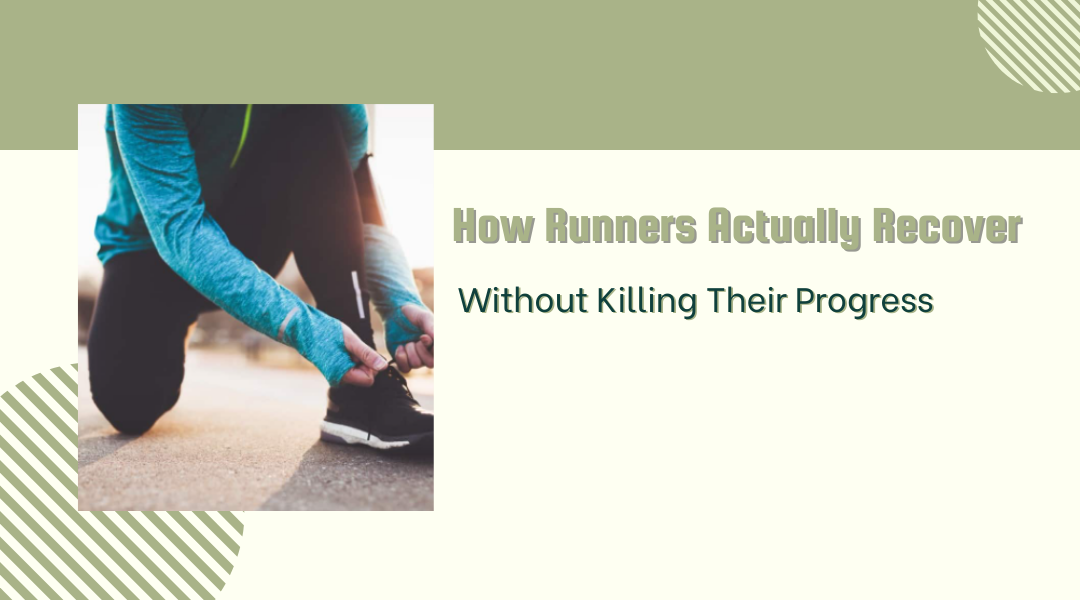Most recovery advice for runners is either overly scientific (cortisol this, glycogen that) or uselessly vague (“rest more”). Meanwhile, the runners who stay healthy and keep improving? They’ve figured out their own personal recovery formula. Here’s how to build yours.
1. Stop Guessing—Track What Actually Wrecks You
That “easy 5-miler” in 90° humidity? Probably crushed you more than a tempo run in perfect weather. Recovery starts with knowing what your body considers hard.
- The 3 things to log religiously:
- Perceived effort (1-10 scale—be honest)
- How you felt after (energized? wrecked for hours?)
- Life stress that day (work chaos, bad sleep, etc.)
- Tech helps, but isn’t mandatory: A $20 heart rate strap shows if your “easy” run was secretly stressing your system. No gear? Just check your morning resting pulse—if it’s 5+ bpm higher than usual, you’re cooked.
Real example: A trail runner realized her “recovery runs” were spiking her HR because she was subconsciously pushing on hills. Switched to flat routes and stopped feeling chronically drained.
2. The Overtraining Signs Everyone Ignores
It’s not just sore legs. Your body gives subtler warnings:
- You’re hungry all the time—or not at all (both are red flags)
- Small cuts take forever to heal (your immune system’s tapped out)
- You keep replaying arguments in your head (elevated cortisol = irrational irritability)
- Your paces feel fine… but you’re bored by running (mental fatigue hits first)
Fix it fast: Take 2-3 days completely off. Not “easy miles”—off. Sleep in, eat steak, binge Netflix. If you come back feeling like a new person, you were flirting with burnout.
3. Recovery Isn’t One-Size-Fits-All
Sprinters vs. marathoners vs. ultrarunners need totally different approaches:
- Short-distance speed demons:
- Priority: Nervous system recovery (sprinting fries your wiring)
- Do this: Cold plunges post-workout, extra sleep on hard days, magnesium glycinate before bed
- Skip: Long “recovery runs”—swap for swimming or cycling
- Half/full marathon grinders:
- Priority: Joint care + glycogen reloading
- Do this: Compression socks after long runs, tart cherry juice for inflammation, 20-min post-run walks
- Pro tip: Foam roll before bed—you’ll sleep deeper
- Ultra crazies:
- Priority: Not losing your mind (and fixing battered feet)
- Do this: Epsom salt foot soaks, “eating like a teenager” post-long run (seriously—hit that pizza), 10-min meditation post-run
- Secret weapon: Trail toes who walk barefoot on grass regain foot sensitivity faster
4. The “After-Run 30 Minutes” That Fixes Everything
What you do immediately post-run dictates how you’ll feel tomorrow:
- Drink salt water (not plain—add electrolytes or a pinch of sea salt)
- Eat something within 20 min (even a handful of nuts beats waiting)
- Walk 5-10 mins (flushes lactic acid better than sitting)
- Change clothes ASAP (wet gear = chill = stiffness)
Bonus hack: Runners who do 2 mins of diaphragmatic breathing post-run report less next-day soreness. Try it—lie down, hand on belly, breathe deep into your gut.
5. When to Ignore Recovery Advice
- “You must stretch!” → Unless you’re hypermobile (then it makes you more injury-prone)
- “Ice baths for everyone!” → Great for acute swelling, terrible for muscle growth if you lift weights too
- “Carbs are king!” → Works for marathoners, but keto-adapted ultra runners swear by fat
Your turn: Pick one recovery tweak this week—maybe logging your post-run mood or trying post-run salt water. Small changes beat perfect plans.
Final thought: The best runners aren’t those who never get tired—they’re the ones who notice they’re tired before it’s too late.
